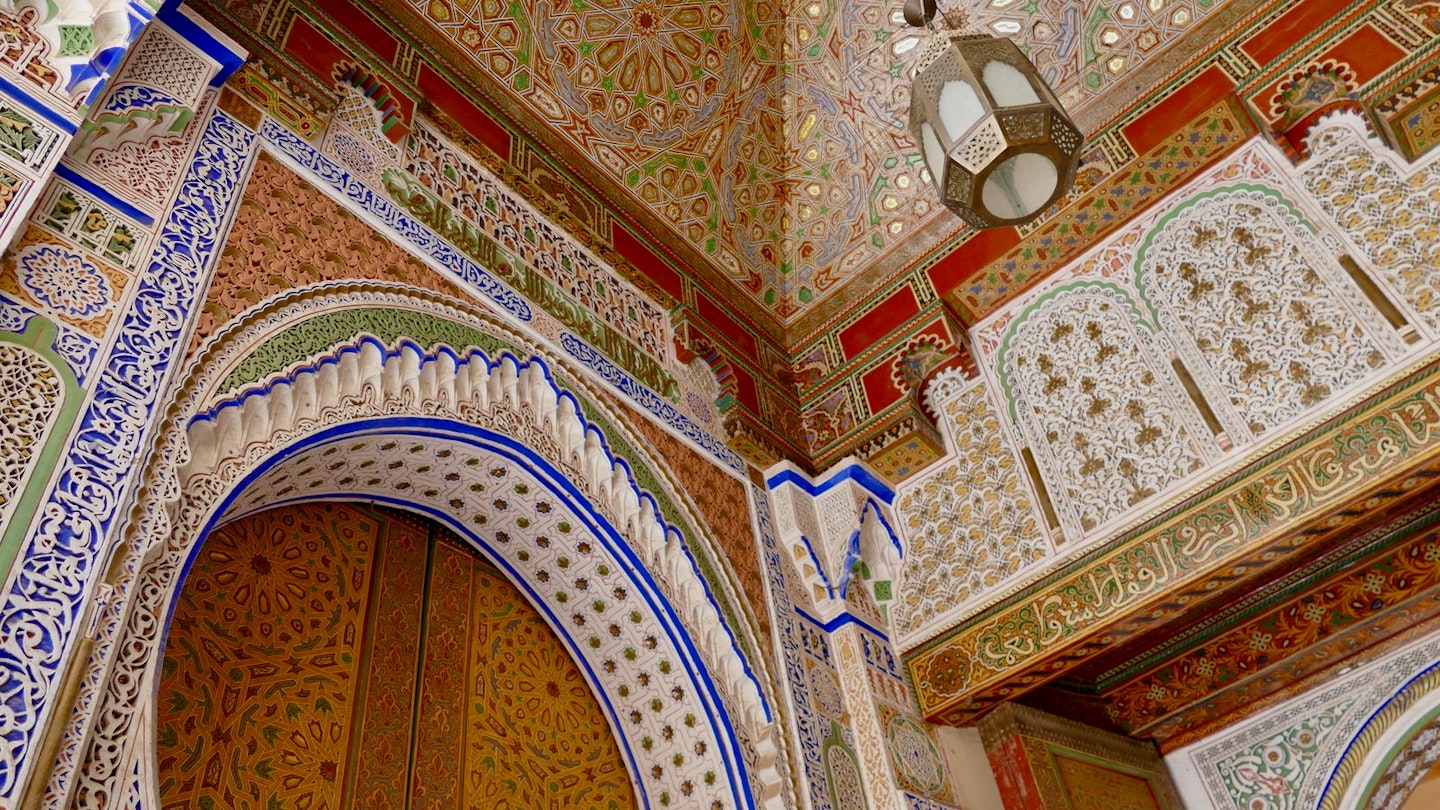Experience the Artisan Heritage of Fez, Morocco
For centuries, the imperial city of Fez has been renowned as one of the world’s great craft centers. Along the medieval medina’s twisting alleyways, time-honored traditions of leatherwork, brass etching, woodcarving, and more have been handed down through generations.
As today’s Fassi artisans face increasing competition from machine-made and imported goods, newly restored funduqs – ancient inns once used by traveling merchants – are being transformed into hubs for disappearing crafts. Designers are breathing new life into age-old techniques, and you can go behind-the-scenes on interactive tours.
Meet the Artisans with Culture Vultures
On the half-day Artisanal Affairs tour from Culture Vultures, you’ll wander the lanes of the medina and get the chance to meet, and with the aid of your guide, talk to craftspeople in their workshops. Depending on your interests and who’s available, you might meet weavers, wood painters, and leather makers.
Perhaps you’ll encounter 87-year-old Abdelkhader El Ouazzani, who still operates at his wooden loom. His hands and feet skillfully navigate the complex maze of 4000 interlinked threads to create shimmering silk brocade. This stunning fabric could suit a New York fashionista or a Fassi bride. Alternatively, you might meet Abdul and Nordeen in their compact workshop, where they put the finishing touches on an ornately painted wooden door destined for the Middle East, a creation no machine can replicate.
Culture Vultures also offers tours of Fez’s artisan school in Batha. Traditionally, trades were passed down from master craftsmen to child apprentices, who honed their skills instead of attending formal schooling. Today, aspiring artisans can learn over 20 different trades in this modern facility, in addition to literacy, marketing, and computing classes. You can witness woodworkers, plaster carvers, and babouche (the quintessential pointed leather slippers) makers while absorbing the traditional songs they sing during their work.
Get Hands-On
If you’re eager to engage actively, participating in a Craft Draft workshop with social entrepreneur and multi-talented artisan Hamza El Fasiki will immerse you in Fassi crafts, including bookbinding, brass etching, and leather embossing. Hamza, who was trained by his master craftsman father, will introduce you to a multitude of tools used in brass and gold etching. Each tool has a unique name, marking its special function.
If you decide to create a leather-bound book, you’ll find yourself at the workbench with basics like a compass for drawing circles, a metal scorer for lines, and a ruler. Notably, copying Hamza’s Islamic-inspired cover design requires no measuring, only keen eyes and steady hands. As Hamza states, ‘no perfection, no eraser.’ He even makes his own paper, providing you with ready-prepared folded sheets, known as a signature, before demonstrating the rhythmic Coptic-style binding technique. After three hours, you’ll leave with your handcrafted, beautifully imperfect creation.
Artisanal tours are available from Plan-it Morocco, offering you the chance to learn how to create slippers, throw pots, or even make your own drum. In a tucked-away funduq, a drum-making production process unfolds. This collaborative effort involves three artisans: one paints the ceramic base, another prepares camel hide, and the third stitches the skin tightly over the base. In a neighboring leather workshop, you can hand-stitch your own pair of traditional Fassi yellow babouche, made from goatskin, cowhide, and soft sheepskin.
Fez boasts a rich history of pottery making, and on the city’s outskirts, you can witness the age-old techniques behind its iconic blue-and-white ceramics, characterized by intricate geometric patterns. This process includes shaping clay on foot-operated wheels, drying the pieces, hand painting, and firing them in intense kilns.
Where to Shop in the Medina
Fassi handicrafts were historically transported by camel trains, with merchants lodging in funduqs, where they stored goods. Animals were kept on the ground floor, while merchants slept above. Many of these stunning architectural gems were abandoned over time, however, a dedicated restoration initiative has revitalized several of Fez’s funduqs. This collaborative effort is part of a project involving ADER-Fès and the US Millennium Challenge Corporation.
The 13th-century Chemmaine-Sbitryine funduq on Rue Quaraouyine showcases disappearing crafts such as wooden hammam buckets, finely decorated fire bellows, and colorful Fassi embroidery. Within this space, you will find exhibition areas, cafes, and areas for artisans to create and sell their work. The Barka funduq on Rue Kettanine focuses on women’s cooperatives, providing a platform for Moroccan women who previously worked from home to present their creations, including hand-stitched kaftans, hand-loomed carpets, and unique jewelry made from buttons.
For a contemporary touch, visit Fez’s first concept store, Médin’ART, opened by Laurence Alberro in 2014. This store has become a nexus for Moroccan designers, offering a fresh take on classic crafts. You can find embroidered T-shirts by Mawj, finely woven cotton and leather scarves by Mouhib, and naïve weavings by Ashraf, a self-taught young artist. The offerings also include the work of French-Moroccan designer Ytto and Italian designer Jabi, who collaborates with local artisans to create stylish jackets edged with traditional sfifa embroidery. Cecile’s line includes highly sought-after bags crafted from sabra, Moroccan cactus silk.
Don’t miss the iconic sights (and smells) of the Fez medina: the medieval Chaouwara Tanneries. Here, you can observe the vibrant dye-filled stone vats, where animal hides undergo a process of stripping, treating, dyeing, and drying, which has hardly changed since the 11th century. Surrounding shops offer a variety of leather goods, including pouffes, slippers, bags, and butter-soft jackets, often available for custom orders within 24 hours. Bargaining is customary, but engage only if you are seriously interested in purchasing.





